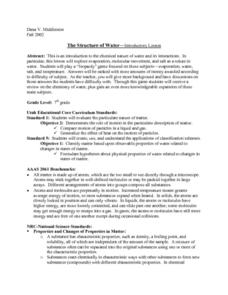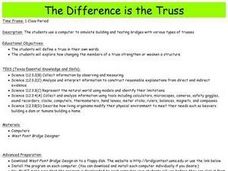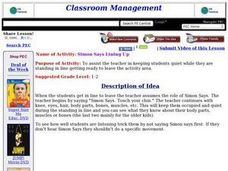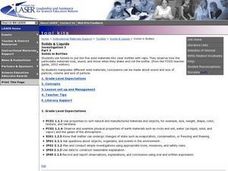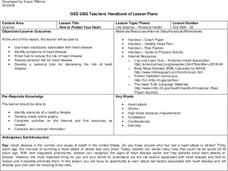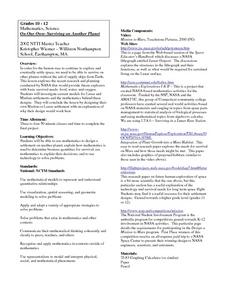Curated OER
The Chemical Nature of Water
Seventh graders simulate a Jeopardy game to examine the chemical nature of water. Among the topics featured are evaporation, water, salt, and temperature. finally, as review, 7th graders answer a battery of questions presented by the...
Curated OER
Sea Floor Spreading I
Students use Excel to explore the geodynamics Model equation for ocean depth around a sea-floor spreading center. They complete an introductory tutorial on Excel for students with no prior Excel experience.
Curated OER
Introduce Solids
Students identify and interpret a variety of solid materials - cloth, wood, metal, plastic, paper, and rubber. After a period of free exploration, they then describe the properties of the objects and develop vocabulary in order to...
Curated OER
Solids and Water
Learners investigate mixtures made of water and familiar solid materials. They observe and discuss the changes that occur immediately and set the mixtures aside for a day. Finally, students observe the mixtures, note changes, and graph...
Curated OER
Periodic Table Basics 2
In this periodic table worksheet, students create cards for a annotated periodic table then use it to answer 16 short answer and fill in the blank questions.
Curated OER
Lightening the Load
Students explore a study of African women who are able to carry heavy loads by altering their gait; they then conduct experiments that study the relationship between exertion, weight and heart rate.
Curated OER
Atmospheric Pressure
Ninth graders explore the abstract idea of the atom and explain the differences and similarities between solids, liquids, and gases. They understand the molecular differences between solids, liquids, and gases.
Curated OER
Honey ! I Blew Up The Bee!
Second graders complete a variety of bee-themed activities. They consider the importance of honeybees in food production, conduct Internet research, prepare foods using honey, complete puzzles and compile a portfolio of their work.
Curated OER
Hawaiian Bowl!
Students describe the movement of tectonic plates in the Hawaiian archipelago region. They describe how a combination of hotspot activity and tectonic plate movement could produce the arrangement of seamounts obse
Curated OER
Urban Impact on Chollas Creek (California): A Field Study
Students, in groups, take samples from a creek and keep a field journal on their samples. They also perform tests on their samples.
Curated OER
Raleigh Bound!! A Virtual Tour
Fourth graders navigate a DPI web site to answer questions as they preview the Capitol, Legislative Building, and Museum of Natural Sciences before an actual trip to Raleigh.
Curated OER
Mixing in the Kitchen
Students identify the different types of mixtures. They identify examples of solutions, suspensions, colloidal dispersions, and emulsions through a game and basic experiments.
Curated OER
Fred the Fish
Pupils read and retell the story of Fred the Fish. In groups, they create their own story of a similar nature and identify a situation in their community like the one in the story. They create possible solutions to the problem and...
Curated OER
The Difference is the Truss
Students use a computer to simulate building and testing bridges with various types of trusses.
Curated OER
Introducting the Concept of Medical Ecology
Tenth graders examine the effects of the breakout of the West Nile Virus. They make predictions on its origin. They develop and present an action plan to stop the virus from spreading.
Curated OER
Fishing for Good Nutrition
Students identify the food group that various foods fit into according to the food guide pyramid.
Curated OER
Brine Shrimp Life Cycle
Second graders investigate the life cycle of the brine shrimp. They use a variety of resources to find the details of each step. Students compare the life cycles of different organisms. They create diagrams of the different stages while...
Curated OER
Simon Says Lining Up
Students practice keeping quiet while standing in line. They play Simon says with the teacher to identify the parts of their muscles, bones, or other body parts such as hair, knees, and eyes. Students complete movements only if they...
Curated OER
Construct with Solids
Students discover which properties of solids lend themselves to building a tower through hands on trial and error and observation of others as they are building. They write down the steps it took them to build the tower and label an...
Curated OER
Solids in Bottles
Students use funnels to put the five solid materials into clear bottles with caps. They observe how the particulate materials look, sound, and move when they shake and roll the bottle. Finally, students write "sound and touch" poetry.
Curated OER
The Solar System
Students research origin of solar system, discuss theories they have found, and create paper mache solar system models.
Curated OER
How to Protect Your Heart
Students examine risk factors associated with heart disease and develop their own personal plans for decreasing the risk of heart disease.
Curated OER
Breathing Easier
Students explore asthma, and then write proposals outlining how teachers, coaches, administrators and school support staff can be better prepared to treat students with asthma.
Curated OER
On Our Own- Surviving on Another Planet
Students investigate current models for Lunar and Martian settlements and study the mathematics behind these designs. They design their own Lunar or Martian settlement with an explanation of why their model would work best.


